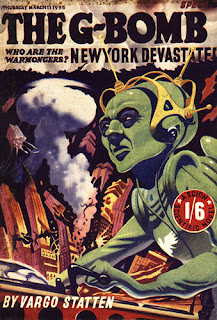Despite initial appearances, this is a review of
Spellbound, by Larry Correia... eventually...
When you hear the words "concentration camp" you generally think of Nazis. If I ask you to name a non-Nazi concentration camp, you might be stumped. And if I asked you who invented the concentration camp, you probably would not have said the British.
Though the British used concentration camps to oppress the Boer population of South Africa, other fascist countries were quick to learn from their example.
After the Japanese attacked Pearl Harbor, the Federal government rounded up citizens of Asian, particularly Japanese, ethnicity and put them in concentration camps. We just called our camps something different.
So, don't say things that have
already happened here can't happen here.
I finished grad school and applied for work as a Mathematician. The people hiring the most Mathematicians then was the NSA. The job required I pass a lie detector test. I tripped on one yes/no question: Are you a Fascist?
Keep in mind Hitler was dead a decade before I was born. What could the question mean? I was a Republican then. I was a lifelong anti-Communist. I intended to and did vote for Reagan.
I asked, "What's a Fascist?"
The lie detector operator was an old guy who probably fought WW2 and he said something about Nazis. "Oh, that? No way!" And I passed the test.
Years before that I saw on live network television William F Buckley
threaten violence upon Gore Vidal who had slanderously called him a crypto-Fascist. Was Buckley a Fascist? What is a Fascist, crypto or otherwise? A couple years ago, Jonah Goldberg wrote
the book on fascism. And he made the case that several prominent US politicians held Fascist opinions. Sinclair Lewis wrote the novel "
It Can't Happen Here."

Ominously, Larry Correia's characters in his novel
Spellbound echo the words, "It can't happen here." He also puts the words "never let a crisis go to waste" in the mouth of the antagonist. He that has ears to hear should keep an eye between the lines of Spellbound.
In the 1930s America faced the real possibility of becoming a Fascist state. And in the parallel universe of Spellbound the possibility is even more imminent.
If you're a fan of Marvel's X-Men, you'll see parallels with Hard Magic and Spellbound. I've always thought Magneto to be less interested in being a bad guy and more interested in protecting mutants from Nazi-style enslavement and discrimination.
The normals versus magic-users schism is one of the axes upon which Spellbound turns. It is just a matter of time before the government passes a law requiring magic users to wear a Star of David badge--or something like that.
The white hats in Spellbound are all members of the Grimnoir Society, a secret bunch whose elders are all euro-weenies counseling caution and deceit. Though their deceit is vindicated--after a fashion--in Hard Magic, you'll find foreshadowing of more deceit in Spellbound.
Spellbound is the middle book in a trilogy. As such, you should expect to see a lot of bad things to happen to good people to set up the third book. Nevertheless, there are some interesting new characters introduced.
Fans of Robert A Heinlein should keep an eye out for an Easter Egg. When you write a parallel universe novel set in the golden age of Science Fiction, I think you are honor-bound to give one of the grand masters a walk-on role.
Likewise, if you're a fan of Buckminster Fuller, and his way of using language, you'll get a huge laugh out of Spellbound.

One character from the first book, Faye, takes on a prominent role in Spellbound. She can teleport and she knows how to fight. Turns out she's very good at killing. And she does so gleefully. At least one Amazon reviewer has called her a psychopath, drawing a moral equivalency to the bloodthirsty black hats. I disagree.
I think Larry Correia is playing a deeper game: The glee is intentional: it's partially addressed by Spellbound, and I will have to read Warbound to confirm this. Faye has taken a lot of lives, but they were all in battle, or they needed killing. And she does a good job of not-killing those who irritate her.
The villain in Spellbound is delightfully evil. He is soooooo evil, he even makes J. Edgar Hoover look good. And that's saying something. I loved Spellbound. It deserves all five stars.
I'm looking forward to the 3rd installment, Warbound. If you haven't read
Hard Magic, you've missed a treat.
I have also reviewed
Hard Magic, the first book of this series. As well as
Warbound, the third book of this series.
 Consider the stories you've read.
Consider the stories you've read. What you cannot do is put E. T. in the 25th Century.
What you cannot do is put E. T. in the 25th Century.
























